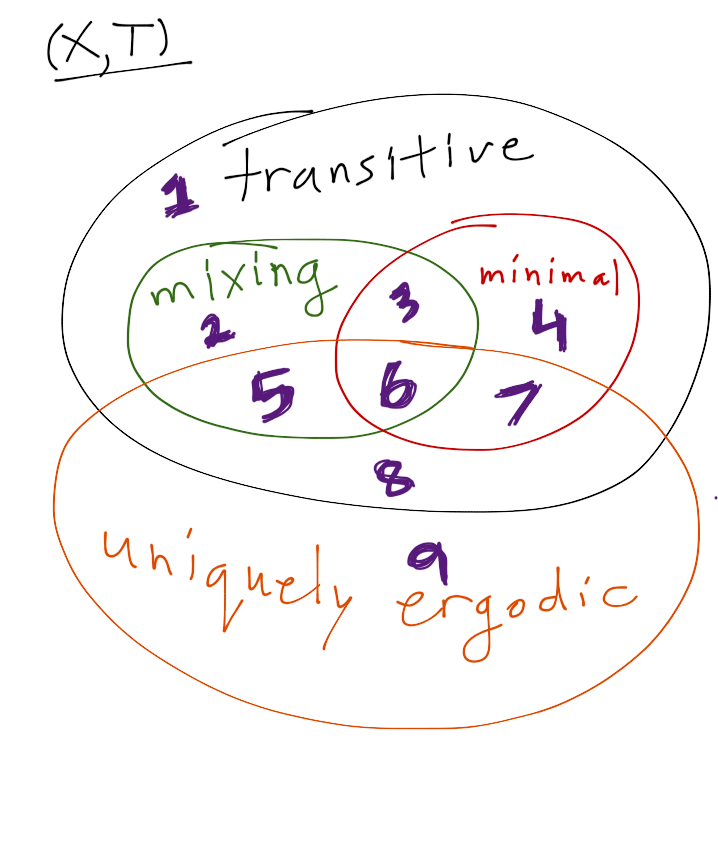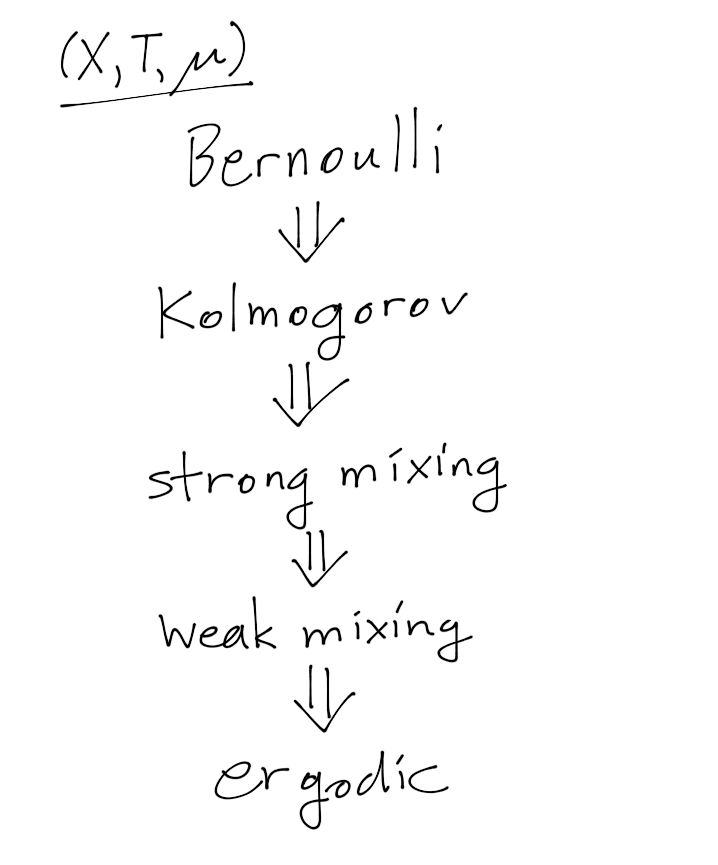Edit: I've updated this answer to reflect the helpful comments made by Andres Koropecki and Ian Morris.
As the other answers mentioned, the first crucial distinction you must make is that some properties refer to a topological dynamical system $(X,T)$, while others refer to a measure-preserving dynamical system $(X,T,\mu)$. Thus there are two different sets of definitions. Let me attempt a sketch at some of the relationships within each set.
First suppose you have a topological dynamical system $(X,T)$. Then four of the key properties are topological transitivity, topological mixing, minimality, and unique ergodicity. The first three are related by
- topologically mixing $\Rightarrow$ topologically transitive;
- minimal $\Rightarrow$ topologically transitive.
Unique ergodicity is independent of those three properties. The picture is the following.

Counterexamples 1-9 illustrating the strict containments are as follows. (These may not be the simplest or the earliest counterexamples in each case, and I welcome corrections or improvements. This is based on some quick googling for things not already in my memory, plus the helpful additions offered by commenters.)
1. $X = \Sigma_2 \times \{a,b\}$, the direct product of a full two-shift with a period-two orbit, where the dynamics is $\sigma\times S$, with $\sigma$ the shift map and $S$ the map interchanging $a$ and $b$.
2. $X=\Sigma_2$.
3. Constructed by Bassam Fayad, Topologically mixing and minimal but not ergodic, analytic transformation on $\mathbb{T}^5$, 2000.
4. Constructed by Furstenberg, Strict ergodicity and transformation of the torus, 1961.
5. An irrational flow on the torus, slowed down near a single point: see the comment below by Andres Koropecki.
6. As Ian Morris points out in the comments, the identity map on a singleton set works here. A less trivial example was given by Karl Petersen, A topologically strongly mixing symbolic minimal set, 1970.
7. Rotation of the circle by an irrational angle.
8. Direct product of the example from 5 with a periodic orbit. (Again as suggested by Andres in the comments.)
9. North-south map: a map $T\colon [0,1]\to [0,1]$ with fixed points at $0,1$ and such that $T(x) < x$ for all $x\in (0,1)$. Identify the endpoints $0$ and $1$ so that this is a uniquely ergodic circle map.
A couple things are probably worth pointing out.
- Terminology is not always uniform. For example one of the papers I referenced (I think Petersen's) uses "ergodic" in place of "topologically transitive", to highlight the analogy with the measure-preserving case. So people may sometimes use different words for the same thing.
- Conversely the same word may mean different things. There are two definitions of topological transitivity, one involving open sets ($f^n(U) \cap V \neq \emptyset$ for some large $n$) and the other involving existence of a dense orbit. The definition involving open sets more closely mirrors the definition of topological mixing (non-empty intersection for every large $n$), while the definition with a dense orbit more closely mirrors minimality (denseness of every orbit). The definitions are equivalent if $X$ is separable, second category, and has no isolated points.
All of the above is for topological dynamical systems, where no invariant measure is specified. Then there are the ergodic properties: those that depend on a system preserving an measure $\mu$. For these one has the ergodic hierarchy.

It is very often the case that one wishes to study a topological dynamical system as a measure-preserving system by equipping it with an invariant measure, and in this case it is quite reasonable to ask about the relationships between the two different classes of properties. But this depends on which invariant measure you choose, because in general there may be very many of them. One may ask what properties of $(X,T)$ let you pick invariant measures $\mu$ with certain nice properties, and this is a whole different story which would expand this answer far beyond the bounds of propriety.


Best Answer
For a beautiful overview, focusing on entropy and the variational principle, you can't beat Walters' book. I've given reading courses from it, and it is very well written and excellent for self-study.
The Einsiedler-Ward book (the first of a projected three volumes, parts of the second and third books are viewable at http://maths.dur.ac.uk/~tpcc68/welcome.html) also covers the basics extremely well and at a leisurely pace, with more emphasis on topics crucial to deep applications of dynamics to number theory via homogeneous spaces, which is a very active research area.
Given your short time frame, I'd suggest using Walters as the basic text, but also browsing Einsiedler-Ward for topics of more current research interest. Should any students get interested enough to delve more deeply, then a more systemic reading of Einsiedler-Ward would provide them with a very solid foundation.